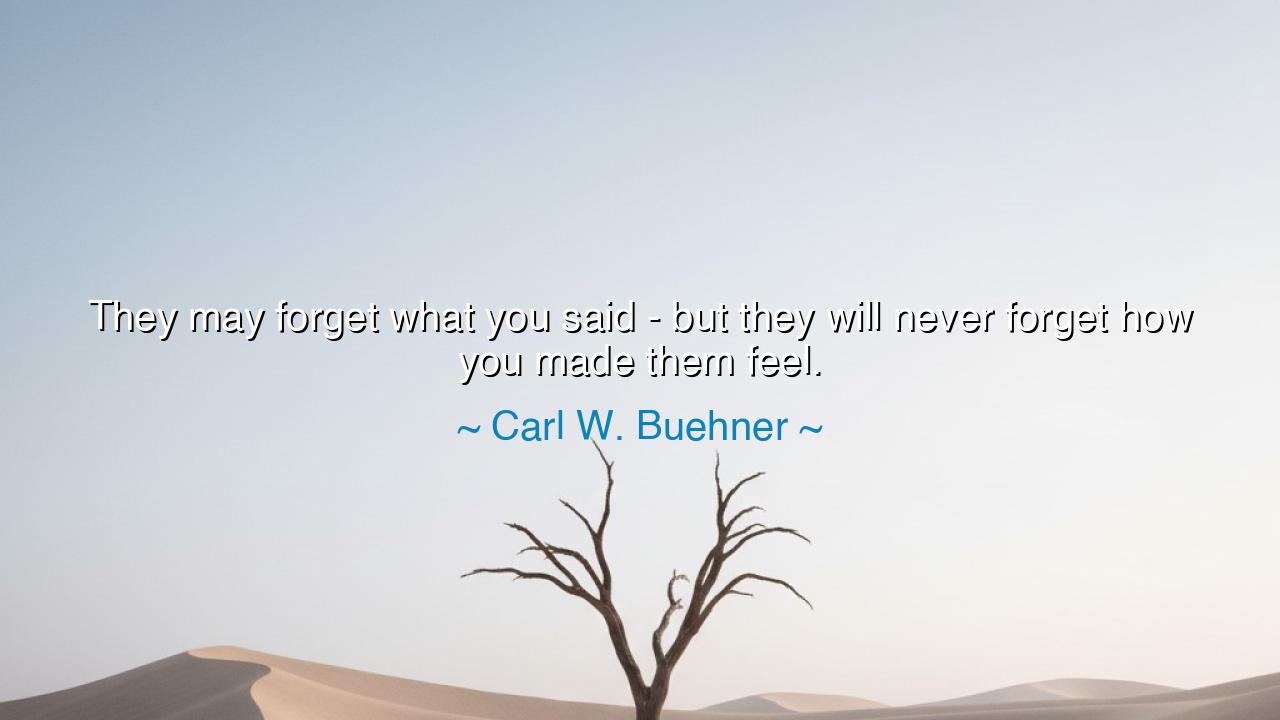
They may forget what you said - but they will never forget how






The wise Carl W. Buehner, a man of quiet insight and timeless perception, once spoke a truth that has echoed through generations: “They may forget what you said – but they will never forget how you made them feel.” In these few, simple words lies a truth deeper than reason, older than language itself—the truth that emotion, not intellect, binds the hearts of human beings together. Words may fade, deeds may be forgotten, but the impression of the heart—that invisible mark left upon another soul—endures beyond all memory. For though the mind records facts, it is the heart that remembers how we were made to feel in the presence of another.
To understand the meaning of this quote is to understand the essence of human connection. We live in a world overflowing with words—arguments, commands, speeches, and instructions—but few of them linger in memory. Yet one kind word, one moment of kindness or cruelty, one gesture of compassion or indifference, can alter a person’s life forever. Buehner teaches us that influence is not the art of eloquence, but of empathy. The greatest leaders, teachers, and friends are not remembered for the precision of their words, but for the warmth, hope, and strength they inspired in those who heard them.
The origin of this wisdom lies not in the study of philosophy or logic, but in the observation of life itself. Carl W. Buehner, a leader in his faith and a student of human nature, saw that communication is more than speech—it is the exchange of energy and emotion between souls. He understood what even the ancients knew: that the heart feels before the mind comprehends. Long before him, philosophers like Aristotle spoke of pathos, the emotional power that moves people to act; and even the sacred teachers of old knew that truth spoken without love becomes as lifeless as dust. To touch another’s soul, one must first make them feel.
History gives us many examples of this eternal truth. Consider Mother Teresa, who spoke softly, without grandeur or ornament. Her words were simple, but her presence was powerful. The poor and forgotten of the world did not remember her speeches—they remembered her eyes, her touch, her compassion. In her, they felt seen, felt human, felt loved. Or recall Abraham Lincoln, whose words of unity and forgiveness during a nation’s darkest hour did not merely persuade—they healed. His strength lay not only in his eloquence, but in the way he made a broken people feel dignity again. These souls, like Buehner, understood that the true art of influence is not mastery of language, but mastery of the heart.
To make another feel is to reach the eternal part of them. When you speak with kindness, you awaken trust. When you act with respect, you kindle belonging. When you show love, you leave a mark that outlives the moment. The harsh word may be forgotten, but the wound it leaves may linger for years. Likewise, the gentle act of compassion may seem small, yet its warmth may endure in memory like a light in the darkness. Therefore, we must learn not only to speak with intelligence, but to live with feeling—to let our words be vessels of empathy, and our actions the language of the soul.
Even in the realm of leadership and creation, this wisdom reigns. The teacher who inspires wonder in her students teaches more than the one who recites facts. The leader who stirs courage in his people leads better than the one who commands obedience. The artist who evokes emotion creates something that will never die, for the heart remembers what the mind forgets. To touch hearts is to transcend time; to stir emotion is to plant something eternal.
So let this be your lesson, seeker of truth: guard your words, but shape your presence even more carefully. Speak with intention, but act with compassion. Ask yourself not only, “What did I say?” but “How did I make them feel?” For every encounter is an imprint, and every moment with another soul is a chance to either uplift or diminish. The legacy of your life will not be written in the sentences you spoke, but in the emotions you awakened.
Remember always Buehner’s teaching: “They may forget what you said – but they will never forget how you made them feel.” Strive, then, to make others feel valued, seen, and understood. For the greatest mark of a wise and noble soul is not what it knows, but what it gives. Words fade like smoke, but kindness is immortal—it lingers, echoes, and lives forever in the human heart.






AAdministratorAdministrator
Welcome, honored guests. Please leave a comment, we will respond soon